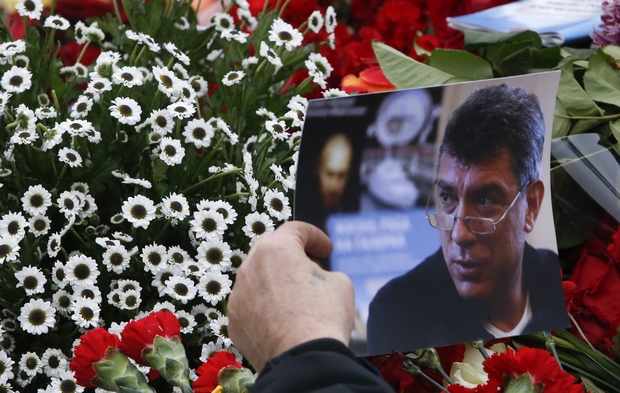
MOSCOW — Russian investigators say they are looking into several possible motives for the killing of prominent opposition figure Boris Nemtsov, including an attempt to destabilise the state, Islamic extremism, the Ukraine conflict and his personal life.
The statement from the Investigative Committee did not address the possibility seen as likely by many of Nemtsov's supporters — that he was slain for being one of President Vladimir Putin's most adamant and visible critics.
Putin himself responded quickly with a pledge to find and punish the murderers.
"Everything will be done so that the organisers and perpetrators of a vile and cynical murder get the punishment they deserve," Putin said in a telegram sent to Nemtsov's mother and published on the Kremlin's website.
Nemtsov, 55, was gunned down on Friday near midnight as he walked on a bridge near the Kremlin with a female companion. The killing came just a few hours after a radio interview in which he denounced Putin's "mad, aggressive" policies and the day before he was to help lead a rally protesting Russia's actions in the Ukraine crisis and the economic crisis at home.
After his death, organisers canceled the rally and instead called for a demonstration to mourn him on Sunday in central Moscow. The city gave quick approval for that gathering, in contrast to its usual slow and grudging permission for opposition rallies.
The Investigative Committee said it was looking into whether Nemtsov had been killed as a "sacrificial victim for those who do not shun any method for achieving their political goals", a suggestion echoing the comments by Putin's spokesman and other Russian politicians that the attack was a "provocation" against the state.
It also said it was considering whether there was "personal enmity" toward him in his domestic life.
State-controlled TV and Kremlin-friendly media outlets on Saturday gave considerable attention to Nemtsov's companion, identifying her as a Ukrainian model 30 years his junior and showing photos of her in alluring poses. The Investigative Committee said the pair were headed for Nemtsov's apartment.
The statement also said it was investigating whether the killing was connected to the Ukraine conflict, where Russia-backed separatists have been fighting Ukrainian forces since last April, or whether there was a connection to Islamic extremism.
Nemtsov had been one of Putin's most visible critics and his death hit other members of the opposition hard. The mourning march on Sunday could serve to galvanize the beleaguered and marginalised opposition, or it could prove to be a brief catharsis after which emotions dissipate.
Through the morning, hundreds of people came to the site of Nemtsov's death to lay flowers.
Nemtsov was working on a report presenting evidence that he believed proved Russia's direct involvement in the separatist rebellion that has raged in eastern Ukraine since April. Moscow denies backing the rebels with troops and sophisticated weapons.
Putin ordered Russia's top law enforcement chiefs to personally oversee the investigation of Nemtsov's killing.
"Putin noted that this cruel murder has all the makings of a contract hit and is extremely provocative," presidential spokesman Dmitry Peskov said in remarks carried by Russian news agencies.
President Barack Obama said the Russian people "lost lost one of the most dedicated and eloquent defenders of their rights".
German Chancellor Angela Merkel praised Nemtsov's courage in criticising Kremlin policies, and urged Putin to insure that the killers are brought to justice, her spokesman Steffen Seibert said.
Nemtsov frequently assailed the government's inefficiency, rampant corruption and Ukraine policy.
In an interview with the Sobesednik newspaper, Nemtsov said earlier this month that his 86-year old mother was afraid that Putin could have him killed. Asked if he had such fears himself, he responded: "If I were afraid I wouldn't have led an opposition party."
Nemtsov served as a regional governor and then a deputy prime minister in the 1990s and once was seen as a possible successor to Boris Yeltsin, Russia's first elected president.
Nemtsov was widely liked for his good humour, larger-than-life character and quick wit, but he and other top opposition figures long have been purged from state television and steadily marginalised by the Kremlin.